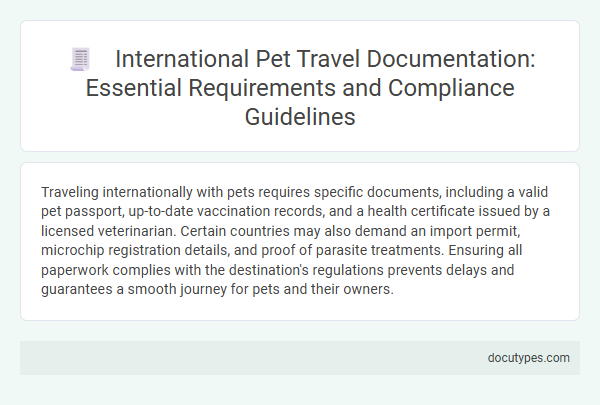Traveling internationally with pets requires specific documents, including a valid pet passport, up-to-date vaccination records, and a health certificate issued by a licensed veterinarian. Certain countries may also demand an import permit, microchip registration details, and proof of parasite treatments. Ensuring all paperwork complies with the destination's regulations prevents delays and guarantees a smooth journey for pets and their owners.
Introduction to International Pet Travel Documentation
Traveling internationally with pets requires strict adherence to specific documentation. These documents ensure your pet's health and safety during border crossing.
International pet travel documentation includes health certificates, vaccination records, and import permits. Understanding these requirements helps avoid delays and keeps your pet comfortable throughout the journey.
Understanding Pet Passport Requirements
Traveling internationally with pets requires specific documentation to ensure smooth transit and compliance with destination country regulations. Pet passports are essential documents that consolidate vital health and identification information for pets traveling across borders.
- Microchip Identification - A microchip must be implanted in the pet for permanent identification linked to the pet passport details.
- Vaccination Records - Proof of up-to-date vaccinations, especially rabies, is mandatory and must be documented in the pet passport.
- Health Certificate - A veterinarian-issued health certificate confirming the pet is fit to travel is required within a specified time frame before departure.
Mandatory Vaccinations and Health Certificates
What specific documents are needed for traveling with pets internationally? Mandatory vaccinations, such as rabies, are required and must be administered within a specific timeframe before travel. Health certificates issued by a licensed veterinarian must confirm the pet is free from contagious diseases and fit for travel.
Microchipping and Identification Standards
Traveling internationally with pets requires strict adherence to microchipping and identification standards to ensure smooth entry at border controls. Your pet must have a microchip that complies with ISO 11784/11785 standards, allowing for universal scanning and identification. Proper documentation linked to this microchip, including vaccination records and a pet passport or health certificate, is essential for pet travel clearance.
Country-Specific Pet Import Regulations
Traveling internationally with pets requires adherence to strict documentation rules that vary by country. Understanding each destination's specific pet import regulations ensures a smooth entry process for your animal.
- Health Certificates - Most countries require an official veterinary health certificate verifying your pet is free of contagious diseases and fit for travel.
- Vaccination Records - Proof of up-to-date vaccinations, particularly rabies shots, must often be presented to comply with local animal health standards.
- Import Permits - Certain countries mandate obtaining an import permit prior to arrival, detailing pet identification and quarantine requirements.
Confirming country-specific pet import rules before departure is essential to avoid delays or quarantine upon arrival.
Approved Veterinary Accreditation and Endorsement
| Document | Description | Purpose | Authority | Key Requirements |
|---|---|---|---|---|
| Veterinary Health Certificate | Official document issued by a licensed veterinarian confirming the pet's health status | Verifies that the pet is free from contagious diseases and fit for international travel | Licensed Veterinarian | Issued within 10 days prior to travel; includes pet identification details, vaccinations, and health status |
| Accreditation of Veterinarian | Certification showing the veterinarian is authorized to perform international pet travel examinations | Ensures the veterinarian meets standards for issuing valid international health certificates | National Veterinary Authority or Official Veterinary Accreditation Body | Veterinarian must be registered and recognized by relevant national or international authorities |
| Endorsement by Government Veterinary Authority | Official validation of the veterinary health certificate by a government-approved agency | Confirms that the health certificate meets the importing country's regulations | Government Veterinary Authority (e.g., USDA-APHIS, CFIA) | Requires submission of original certificate; endorsement is usually a stamp or seal of approval |
| Rabies Vaccination Certificate | Document confirming pet's rabies vaccination status and validity | Required for entry into most countries to prevent rabies transmission | Licensed Veterinarian and Government Endorsement | Vaccine must be administered at least 21 days before travel and within the validity period |
| Pet Microchip Registration | Proof of a microchip implanted for pet identification matching the veterinary documents | Links pet to documentation; often a mandatory requirement for international travel | Microchip Manufacturer and National Registration Database | Microchip number must be included in all documents and be ISO-compliant |
Timeframes and Pre-Travel Planning
Traveling internationally with pets requires specific documents such as a valid pet passport, up-to-date vaccination records, and a health certificate issued by a licensed veterinarian within 10 days before travel. Quarantine requirements and microchip registration also vary by country, so confirming these details well in advance ensures a smooth process. Planning at least two months ahead allows time to complete vaccinations, obtain necessary certifications, and meet import regulations.
Airline Policies and Transportation Guidelines
Traveling internationally with pets requires specific documents such as a valid pet passport, health certificate, and proof of up-to-date vaccinations. Airlines often mandate microchip identification and a recent veterinary health report to ensure compliance with international travel standards.
Airline policies vary but typically include requirements for crate specifications and pet weight limits. Your pet's transportation must adhere to both airline and destination country guidelines to guarantee a smooth journey and avoid travel disruptions.
Common Compliance Mistakes to Avoid
Traveling internationally with pets requires precise documentation to ensure smooth entry and avoid quarantine. Common compliance mistakes can lead to denied boarding or delays at customs.
- Missing or Expired Health Certificates - Vets must issue health certificates within a specific time frame before travel, often 10 days, to validate the pet's health status.
- Incorrect or Incomplete Vaccination Records - Rabies vaccination proof is mandatory and must meet the destination country's accepted timeframe and vaccine type criteria.
- Failure to Meet Microchip Requirements - Pets often need ISO-compliant microchips implanted before vaccination, with the microchip number correctly recorded on all documents.
What Specific Documents Are Needed for Traveling with Pets Internationally? Infographic

